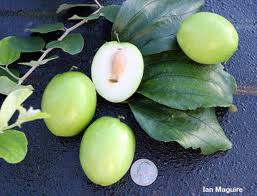
Táo ta, or Vietnamese jujube (Ziziphus mauritiana), is grown throughout the country, particularly in the Mekong Delta, for fruits. The fruit can be eaten raw or pickled, or used in beverages. It is quite nutritious and rich in vitamin C, which is second only to guava and much higher than apples.
Vietnamese jujubes also have several medicinal properties like those of Chinese jujubes

Vietnamese jujubes
Táo ta, or Vietnamese jujube (Ziziphus mauritiana), is grown throughout the country, particularly in the Mekong Delta, for fruits. The fruit can be eaten raw or pickled, or used in beverages. It is quite nutritious and rich in vitamin C, which is second only to guava and much higher than apples.
Studies show that táo ta contains 20-30% sugar, up to 2.5% protein and 12.8% carbohydrates. The fruit has often been used to relieve fever and indigestion. The dried fruit is a mild laxative. Its seeds are sedative and can be used to stop nausea and vomiting. The seeds have often been used to cure diarrhea, or as poultices applied on external wounds.
The leaves have been applied as poultices on external wounds; they can also help relieve fever and asthma. The decoction of the bitter, astringent bark of the tree can halt diarrhea and dysentery. The root is a purgative, whereas the root bark decoction is believed to be able to alleviate gout and rheumatism.
In traditional Vietnamese medicine, táo ta is considered a good laxative for old people. The pulp of the fruit can be sliced and dried, and is used as a stimulant for the kidneys and the digestive system.
The leaves of the Vietnamese jujube can be roasted and simmered with water into a drink. Drink this solution twice a day before meals to treat coughing and asthma.
The broth taken from decocting jujube, lemon and mulberry leaves can help cure long-term coughing and lower high blood pressure.
The broth taken from boiling Vietnamese jujube leaves can be used as an antiseptic solution for external wounds. The decoction of the leaves are often applied as poultices on boils.
The seeds are often dried, roasted well and ground into powder, which is called hc táo nhân in traditional Vietnamese medicine. This herb is considered to be good for the heart, liver and spleen, and is often used as a sedative. It is also used to relieve pain, lower high blood pressure, and ease anxiety and dizziness. It is worth noting that hc táo nhân should be roasted very well (hc means black); otherwise, it may cause sleeplessness.




